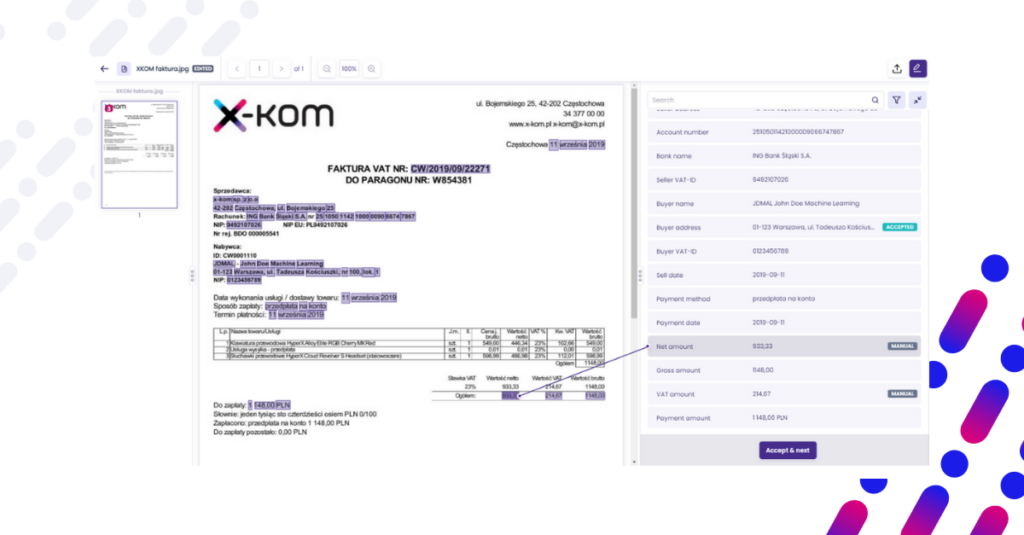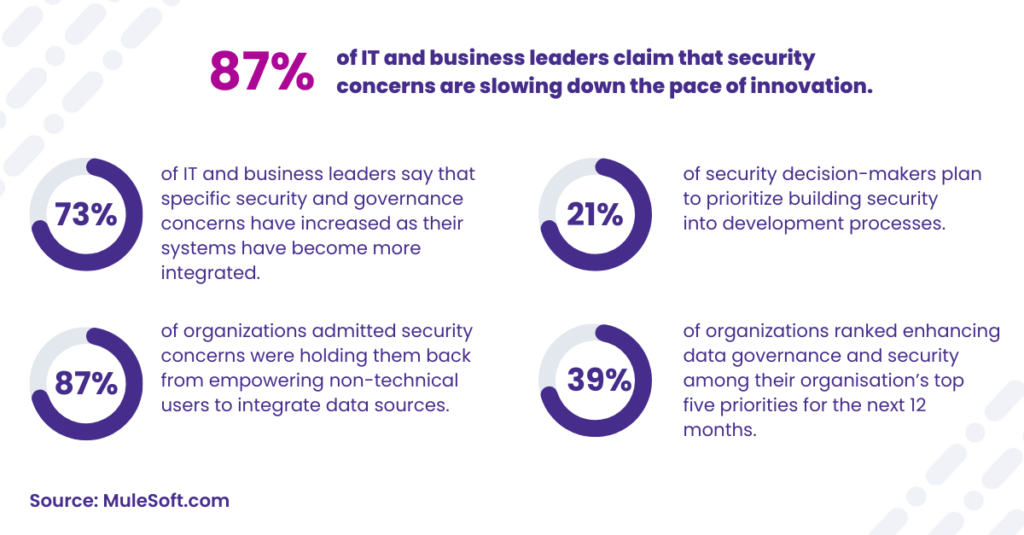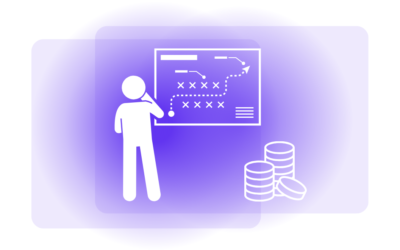Accounting professionals know the nightmare of manual document processing. When docs pile up, processes get stuck on approvals, mistakes multiply, and chaos creeps in.
Thankfully, the apocalyptic visions are nothing but an exaggeration in today’s world, all thanks to the variety of tools that help with accounting automation.
In this article, we deep dive into the current benefits of the automated accounting process, the future of accountants, and where to start with the automation of bookkeeping.
It’s no surprise that professionals in the accounting market see that automation is the new cool kid on the block. There are many drawbacks of traditional accounting processes. Let’s start with that.
The Challenges of Traditional Accounting Workflows
A report conducted by Tipalti provided shocking insights.
The vast majority of finance leaders (80%) in the US and the UK reported that AP processes need to be significantly improved to propel business growth.
From providing insightful financial projections and models to simply overhauling the entire accounting system, a properly functioning finance team is a source of valuable knowledge. And skillful leaders know it.
Furthermore, inefficient accounting processes cause financial losses, delays in deals, and increase the threat of fraud. The same survey also reveals that nearly half (43%) of AP teams spend time on paper-based, repetitive tasks.

Not impressed by the numbers yet?
Well, consider the final nail to the coffin.
On average, nearly 50% of the week’s work time of AP teams is dedicated to automatable tasks. Other research by Bookkeep revealed that AP teams spend up to 38 hours doing tedious tasks that could be automated. Sounds like a lot of time and effort is wasted on manual accounting tasks.
You know the grim picture already – what are the reasons for this state of things? And what can be done to improve it? Well, we might need to analyze the last two years.
While the economic effects of the global pandemic – both the tailwinds and negative tides – are almost impossible to assess, the business world had to adapt rapidly.
E-commerce growth created new opportunities for some, enabling thousands of new businesses to enter the global market.
However, this fact also entails new challenges for accounting teams that need to process more digital documents faster. The growing digitalization of trade caused a surge in document generation, as well as made many business processes more complex, along with confusing regulations to make things more fun.
According to the CEO of Bookkeep:
“The lack of data standards in how e-commerce platforms report, calculate, deposit sales and collect what’s owed is a logistical nightmare for accountants and bookkeepers. It creates thousands of hours per year of extra manual data entry that leads to staff burnout and can hurt firms’ profitability.”
To sum it up, most finance teams see that the traditional model might as well mean going out of business. And while that might sound like fear-mongering, let the numbers from the above sink in.
Now that the picture is crystal clear, let’s look at how your accounting department and internal accounting processes can be improved with technology.
What Is Accounting Process Automation?
Accounting process automation refers to the implementation of software that improves various accounting tasks and processes that were manual and time-consuming. The purpose of automated accounting is to help accounting and finance professionals:
- Improve operational efficiency
- Reduce human error
- Improve key metrics
The automation involves tools such as accounting automation software that are based on artificial intelligence and machine learning. Such tools can automate a lot of tasks ranging from invoice processing to financial projections and monthly budget closings.
Below are some of the most pivotal tasks to automate.

Accounting Ledgers Software
The first step in creating a full-fledged implementation of accounting automation is to find software that constitutes a digitized general ledger (GL).
General ledgers include the top-level overview of the company’s finances – a set of all records that summarize liabilities, assets, equities, as well as revenue and spending channels.
Many companies store this kind of information in large Excel spreadsheets.
That, however, is neither convenient nor safe due to the threat of data breach. For that reason, digital bookkeeping is the recommended route for both small and large companies. Numerous tools can serve as general ledgers, with leading examples of Xero and Quickbooks.
Invoice Automation
Processing invoices manually is another chore of AP teams and a task that is very easy to automate.
One of the most tedious parts of invoice processing revolves around data entry and manual data extraction. When the accounts payables team goes over every invoice and transfers data from paper-based docs to computers, the process usually takes forever.
Well, actually a few days to close the single invoice cycle.
Needless to say, each hour spent on this kind of repetitive work generates costs – tools maintenance, man hours, etc. – and causes frustration.
To significantly speed up the process and forget about the paper-based past, learn more about benefits of automated invoice processing.

Tools such as Alphamoon give you AI-based OCR and data extraction capabilities. It means your accounting team can pull accurate data from any type of document that enters your department.
Even if you work with dozens of physical invoices delivered by a variety of vendors – information extraction is completed in a snap. And no matter if your invoices come in different layouts or languages – Alphamoon’s zero-shot technology can handle any document type.
Payroll Management
Just like delays in invoice payments deteriorate your relationship with clients, late employee payroll transfers are corrosive to your credibility as an employer. Lack of clarity in terms of salary transfers increases the chances of employee resignation.
As you may imagine, the bigger the company, the more complex this task is.
Hence simplification of payroll can be part of your accounting automation plan. Some accounting tools – like Gusto – allow your team to plan regular salary payments, as well as easily approve any additional off-cycle payroll, such as bonuses.
Month-end Reviews
While experts lean toward a belief that finance and accounting will need to adapt to the 24-hours cycle of processing, you still benefit from the traditional end-of-month budget closing.
There’s a method in that all-day-long madness, as well as a reason for it too.
Since the outbreak of the pandemic, businesses have been thrown into an ever-spinning tornado of constant market fluctuations. When things move quickly, the last thing you want is to lose ground under your feet – that is see any traces of disorder in your balance sheets.
Furthermore, analyzing your balances enables your team to have a better grip over the financial liquidity of your assets.
That’s another area of accounting where automation comes to aid.
When all your document influx is robotized, the month-end reviews take significantly less time. Most seasoned accounting experts recommend Xero as the product they choose for dealing with automated budget closings.
Accounts Receivables & Accounts Payables Automation
The bread-and-butter of every finance team refers to the A/R and A/P tasks – streamlining all documents that describe financial liabilities and funds that are secured in the budget as cash inflows.
The expansion of business means your team has to process more payments. Tracking all of the subscription-based software can be a challenge, so the tiny sums that pile up and amount to unexpectedly high sunk costs become an issue eventually.
Cash Flow forecasting
Automation of Accounts Payables is particularly meaningful for future financial projections.
Much of the talk about automated accounting revolves around the value that finance teams get from automation and the value they generate. Analysis of historical data is one competence, but the true merit of a finance powerhouse is when it helps set sail for business as a whole.
Highly accurate projections allow managers to plan recruitment well in advance, create new initiatives and grow budgets in their respective teams.
One of the recommended tools for financial scenario planning is Float.
Other Areas Like Risk Management and Financial Management
The list of tasks that can be automated goes on.
Enterprises introduce automated bookkeeping in areas of risk management & assessment, financial planning, reconciling, and more.
Now that we’ve gone over the quintessential tasks that the accounting process consists of, we can move to discuss the reasons behind the implementation of automated accounting technology.
Benefits of Accounting Automation
While each part of the accounting system can be automated, the role that accountants play in the ecosystem does not diminish. On a conceptual level, automation requires human intervention (rather than taking human jobs).
Hence the next part of this article describes the most important benefits related to the automation of accounting systems.

Automation in Accounting Saves Time
The most tangible benefit of accounting automation is perhaps the time saved on doing things manually.
Consider all the work wasted on most of the repeatable tasks within the whole process.
It’s a simple calculation.
Supposedly a single team member manages to process – that is receive the document, move to the correct folder, conduct manual data extraction and data entry – a single invoice in 15 minutes.
One hour equals four invoices.
One full working day (allowing the employee to eat, rest, and be a human being for an hour) brings us to 28 invoices.
For an AI-based tool that offers invoice automation, data extraction from 28 invoices is a matter of minutes.
And the more documents are part of the data input, the more accurate the model will get. As you can see, invoice automation can give you faster turnaround times while keeping the accuracy in place.
Try Alphamoon and extract data from any document type (50 docs free)
Automation in Accounting Increases Team’s Productivity
Here’s another Captain Obvious benefit: productivity increases when employees don’t have to wade through routine tasks.
Let’s circle back to the previous point about time savings.
Automated accounting creates a space in the calendar of your team. That space is to be filled by tackling more profound tasks and challenges, such as:
- Profiling the vendors and contractors who are late with their liabilities and therefore quickening the debt collection process
- Deep-diving in the pockets of each department and knocking down a few unnecessary payments
- Preparing detailed financial reports on the future situation of the company and the market
Automation in Accounting Reduces The Number of Human Errors
Automated accounting software helps in preventing errors. Businesses tend to lose money due to delayed payments, or lack of transparency in their liabilities. However, we’re only humans guilty of having bad days.
When AI and automation join the pack, there are no bad days!
With all seriousness, one of the “I’m for it” arguments when you’re pushing the idea of automation, should be fewer errors that save time and money:
- Time, because reconciliation and fixing mistakes take time and disrupt the regular flow of work
- Money, because mistakes made in invoices, breaches of contract, and other issues can create additional losses
Automation in Accounting Makes Scanning Document Information Quicker
If you’re an accounting expert yourself, you might know the struggle of back-tracing a single piece of information.
When files aren’t digitized, then going over physical folders and flicking through hundreds of pages isn’t your ideal line of work.
Finding relevant information should be done in an instant, no questions asked.
Automation in Accounting is Easily Accessible as Most Tools are in Cloud
Remember the Excel master spreadsheet part?
Well, good luck sharing this with other people and collecting their feedback.
Files stored in the cloud-based software can be shared and accessed within the company, and every tool offers ways to limit the roles of each member if needed.Cloud systems are also more secure. Increasing security will also be one of the seven top trends of digital transformation in the upcoming years.

No wonder leading providers of accounting software put data security at the front of their technology.
Information concerning your clients and suppliers is considered sensitive data, and apart from the basic means of protection – such as MFA, VPN, and creating back-ups – cloud-based software from established partners boosts your security.
Automation in Accounting Increases Value From Accounting for The Whole Business
The days when accounting was mostly the work of a business archivist, are long gone. Modern companies require their finance teams to support their decision-making process with data.
Without time savings achieved by automated accounting, most finance teams are knee-deep in operational work. Exhaustion and burnout effect will halt employees from focusing on the value-generating part.
Automation in Accounting Helps You Scale the Business
If your business grows, then you cannot let your finance team’s processes and structure hold you back.
Automated accounting systems are designed to fit the pace of scaling, without the need to hire more people. Most bricks that form an entire automated accounting system – in other words, tools that provide upgrades to particular parts of the workflow – have a few tiers to choose from.
Depending on your specific needs, you can adjust the features and capabilities of each software.
One more thing is worth emphasizing. That is the positive long-run ROI effect.
A common apprehension concerning any kind of business automation is the entry costs. Indeed, robotization isn’t cheap.
It requires seniority among those responsible for its implementation; good planning, documentation that nails down every confusing part and a deep understanding of the right metrics to use for measuring the actual benefits.
None of the above is rocket science, to be frank, but people are often bound to stick to solutions that they know well.
Not because we’re all just lazy or embrace archaic approaches for the sake of it. There are many reasons why people are often reluctant to change:
- Managers devising structural updates in secret and then drop them like bombs
- Uncertainty causes people to feel anxious, hence the saying “better the devil you know than the devil you don’t know”
- Change requires more work

You need a bulletproof plan to overcome inertia and spark excitement among those who will benefit from automation.
Automation in Accounting Can Increase Satisfaction of Your Employees
Aside from more tangible outcomes, you should consider the well-being of your finance team (or your own, depending on your position and role).
A study from Salesforce proves that automation – when introduced with proper planning before the implementation – increases productivity and reduces stress. Teams also collaborate better – over 90% of surveyed users link improved teamwork with automation. Moreover, 89% of employees feel happier about their day-to-day jobs and 76% revealed their stress levels are lower.
McKinsey backs up this view, indicating that the next decades will result in over half of workplace activities supported by automation.That also comes in opposition to the concerns regarding job automation and robots taking work from humans. Automation isn’t going to fade away as a trend, and there are reasons to believe that robotisation will heavily impact the labor market landscape forever.

Introducing Accounting Automation Process: Key insights
Disregarding the changes happening in the market can be extremely dangerous for a company.
After all, you’re competing with not only your product, pricing, and customer service but also the ease of your processes and the general appeal, values, and mission that the brand captures.
The new reality is that things happen quickly, with little time for neat preparation. Forget about the blue ocean, because it’s all crimson red now.
Therefore, seeking optimization and process automation exhibits your wit as a business owner, project or team leader, or a specialist who wants to improve. To all the traditionalists out there – sorry folks, it’s happening now.
As explained by Paul Farrell, vice president of industry product management at Oracle NetSuite:
Gone are the days that [finance] can do things at the end of the month, the end of the day, or in batch. It needs to be real-time, and it needs to be always available.
Whether we like it or not, automated accounting is part of that post-pandemic, ever-morphing transformation of business. Since the process is complex, with varying tasks to deal with, it’s best to take steps and plan the implementation carefully.
One of the ways to improve your entire accounting process is to start with intelligent document processing. And Alphamoon can be the partner-in-crime that guides you from day one.
Try out Alphamoon Workspace and extract data from 50 documents for free.



